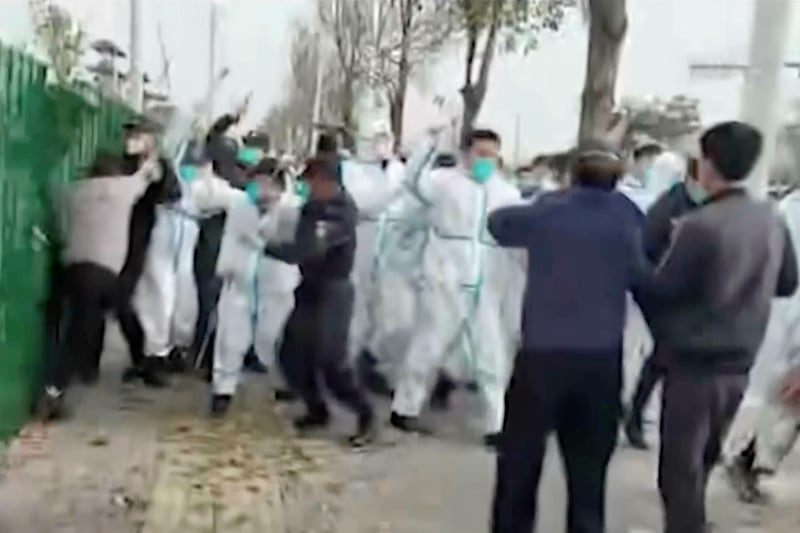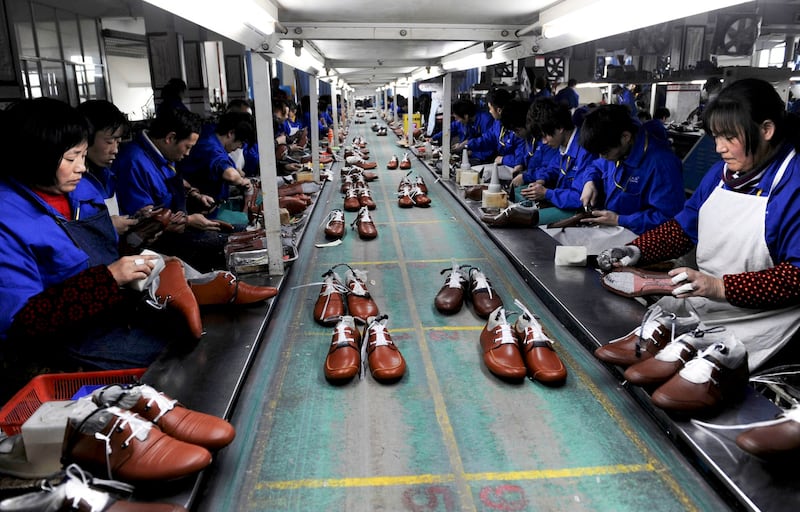A slump at Chinese manufacturers making everything from electronics to clothing is sparking a wave of strikes and labor disputes that will likely intensify in the coming year, a Hong Kong-based labor rights group said in a recent report.
"Based on our observations in 2022, the business closures and market reshuffling within various industries in China will likely become more intense in 2023," the China Labour Bulletin said in its annual report in January.
The group cited a recent decision by iPhone plant Zhengzhou Foxconn to dismantle at least five production lines, while factories in the southern city of Guangzhou's "garment village" have been producing intermittently or even shutting down altogether, slashing workers' income.
"At present, the average monthly salary is only one-third or one-half of their previous income," the report said.
Retailers, real estate companies and factories catering mainly to foreign markets will all face greater pressure, the group predicted.
"Whether China's official channels can effectively handle the labor conflicts between workers and enterprises under the increasing layoffs and wage arrears will be telling for the levels of unrest on the ground in the coming years."
Unrest bubbling
Already, unrest is erupting across the country. Workers at Foxconn's Zhengzhou plant clashed with police in November, as hundreds of laborers protested delayed bonus payments amid mounting anger at China's zero-COVID policy.
Police in the northeastern province of Liaoning detained solar energy tycoon Li Hejun, who was once listed by Forbes as the richest man in China, in December amid reports of wage arrears at several companies in the Hanergy group he founded.
Meanwhile, angry protests seen at a former COVID-19 test-kit factory in the southwestern city of Chongqing on Jan. 7 came after months of wage theft by labor recruitment agencies, a former Zybio worker said in an interview at the time.

The China and Foreign Toys Network reported that five traditional toy companies showed a loss in net profits last year, according to the China Labour Bulletin annual report, while a housewares factory in Guangdong province was in arrears with its workers for three months amid an ongoing decline in the sector.
"The industry has been in decline for years, and many manufacturers face bankruptcy," it said.
Manufacturing has also been hit by three years of rolling lockdowns, transportation restrictions and mass quarantine under Chinese leader Xi Jinping's zero-COVID policy, which ended in early December following mass protests around the country.
Empty book orders
Zhejiang-based businessman Liu Xiaoyi many factories now have empty order books, and many major container ports are slowing down considerably.
"The throughput of Shanghai's ports may be overtaken by Singapore this year," Liu said. "The Americans have taken their orders elsewhere due partly to sanctions but also due to domestic factors which play a big role."
A Zhejiang resident who asked to remain anonymous said the clothing factories where she lives are laying off staff.
"There has been a big collapse, taking the textiles industry around where I live as an example," the woman said. "All the factories would usually be very busy at this time of year, but this year layoffs have become the norm."
"I don't think it's going to get any better over the next few years."
A Zhejiang-based businesswoman said she had lost millions of yuan after a factory she invested in shut down after just a few months.
"The main reason was that there were no orders," she said. "There were no new orders for more than six months. Now the factory I set up has gone bankrupt, and I'm going to have to sell off the machinery just to maintain the status quo."
A shoe factory owner from Zhejiang said nobody expects business to recover soon.
"Our family has been in business for more than 10 years, and we have never experienced business as bad as it is this year," the factory owner said.

"In the past, we would get orders for more than 100,000 pairs of textile shoes from customers in Harbin and Shenyang [or] Zhengzhou," he said. "This year, customers are saying that business is non-existent, so our factory has no orders."
Economic shift
President Xi Jinping had also begun rolling out a number of policies aimed at shifting China's economy away from its traditional export-led manufacturing base once dubbed "the workshop of the world" to an economy driven by domestic demand and the policy aims of the ruling Communist Party.
"The country's debt crisis, expansion of the real estate industry, and property market free fall have increased the incidence of protests for unpaid wages, especially in light of corporate bankruptcy," China Labour Bulletin said, adding that manufacturing is also in the process of transitioning to high-tech production.
Zhejiang-based company founder Lu Wannian said his home province was once a major exporter of clothing and other household goods.
"Nowadays, the bosses of many companies are unwilling to do it any more," Lu said. "Some were even saying they'd rather be migrant workers ... it's just not worthwhile for them to go into business."
"Foreign trade has declined, exports have declined, and the real estate sector is over."
Translated by Luisetta Mudie. Edited by Malcolm Foster.
